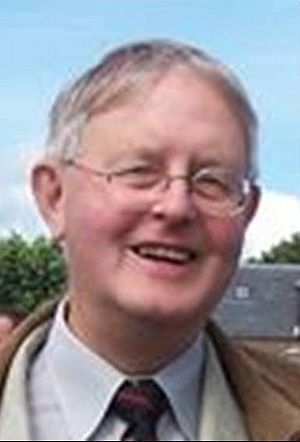Gordon Wilson (Scottish politician) facts for kids
Quick facts for kids
Gordon Wilson
|
|
|---|---|
 |
|
| Leader of the Scottish National Party | |
| In office 15 September 1979 – 22 September 1990 |
|
| Preceded by | William Wolfe |
| Succeeded by | Alex Salmond |
| Depute Leader of the Scottish National Party | |
| In office 1973–1974 |
|
| Leader | William Wolfe |
| Preceded by | Douglas Henderson |
| Succeeded by | Margo MacDonald |
| Member of Parliament for Dundee East |
|
| In office 28 February 1974 – 18 May 1987 |
|
| Preceded by | George Machin |
| Succeeded by | John McAllion |
| Personal details | |
| Born |
Robert Gordon Wilson
16 April 1938 Glasgow, Scotland |
| Died | 25 June 2017 (aged 79) Dundee, Scotland |
| Political party | Scottish National Party |
| Spouse | Edith Hassall (m. 1965) |
| Children | 2 (Margaret and Kate) |
| Alma mater | University of Edinburgh |
| Profession | Solicitor |
| Religion | Free Church of Scotland |
Robert Gordon Wilson (born 16 April 1938 – died 25 June 2017) was an important Scottish politician and a lawyer. He led the Scottish National Party (SNP) from 1979 to 1990. He was also a Member of Parliament (MP) for Dundee East from 1974 to 1987. An MP is a person elected to represent a group of people in the UK Parliament. Gordon Wilson also served as the Rector of the University of Dundee from 1983 to 1986.
Contents
Early Life and Education
Gordon Wilson was born in Govan, Glasgow, Scotland. His mother was Elizabeth Murray, and his father, Robert George Wilson, worked as a butcher's van driver.
He went to Douglas High School for Boys on the Isle of Man. Later, he studied at the University of Edinburgh, where he earned a law degree. After finishing university, he became a solicitor, which is a type of lawyer. He worked in Paisley from 1963 until he became an MP in 1974.
Political Journey
Gordon Wilson joined the Scottish National Party (SNP) in 1959, right after he graduated from university. He was very active in the party from early on.
Early Party Roles
From 1963 to 1964, he was the Assistant National Secretary of the SNP. He then became the National Secretary from 1964 to 1971. He also helped lead the SNP's Oil Campaign Committee. This committee was famous for its slogan, "It's Scotland's oil," which Gordon Wilson himself created. This slogan suggested that Scotland's oil resources should benefit Scotland.
In 1973, Gordon Wilson ran to become an MP for Dundee East in a special election. He lost by a small number of votes. However, the SNP's support in that area grew a lot.
Becoming an MP
Gordon Wilson was successfully elected as the Member of Parliament for Dundee East in February 1974. He won again in October 1974, increasing his lead.
From 1974 to 1979, he was the deputy leader of the SNP group in the UK Parliament. He spoke for the party on important topics like oil, energy, and devolution. Devolution is when power is transferred from a central government to a local or regional government.
Leading the SNP
After the 1979 general election, only two SNP MPs remained in Parliament, and Gordon Wilson was one of them. On 15 September 1979, he was elected as the leader of the Scottish National Party. He took over from Billy Wolfe.
During the early 1980s, the SNP faced some internal disagreements. Gordon Wilson worked to unite the party and make sure everyone followed the party's main goals. He famously said there would not be "parties within the party."
Gordon Wilson led the SNP through two general elections in 1983 and 1987. In 1987, he lost his own seat in Parliament and returned to working as a lawyer.
He remained the party leader even after losing his MP seat. In 1988, another SNP member, Jim Sillars, won a special election in Govan, which was a big win for the party. Gordon Wilson tried to get the SNP involved in talks about Scotland's future, but the SNP did not join because the talks would not discuss Scottish independence.
In May 1990, Gordon Wilson announced he would step down as leader of the SNP. Alex Salmond took over from him.
Later Political Activities
In 1998, Gordon Wilson was chosen as a candidate for the 1999 European Parliament elections. However, he was not elected.
He wrote three books between 2009 and 2014 about his experiences in politics. He also stayed involved in Scottish politics, especially during the 2014 Scottish independence referendum campaign. In 2012, he suggested Scotland could join the European Free Trade Association instead of staying in the EU. He also voted to leave the European Union in the 2016 referendum. After this, he helped create a think-tank called Options for Scotland.
Personal Life
Gordon Wilson married Edith Hassall in 1965. They had two daughters, Margaret and Katie, and five grandchildren.
He was a deeply religious person and a member of Saint Peter's Free Church in Dundee. In 2010, he helped start Solas (Centre for Public Christianity). This group works to spread Christian faith in Scotland and other countries.
He lived in Broughty Ferry, Dundee, and enjoyed sailing his boat, Saorsa, on the Firth of Tay.
Gordon Wilson passed away on 25 June 2017, at the age of 79, after a short illness. His funeral was held in Dundee.
Awards and Recognition
In 1986, the University of Dundee gave him an honorary Doctor of Laws degree.
His political papers and historical documents are kept in various archives. These include the National Library of Scotland and the University of Dundee.
 | Leon Lynch |
 | Milton P. Webster |
 | Ferdinand Smith |

